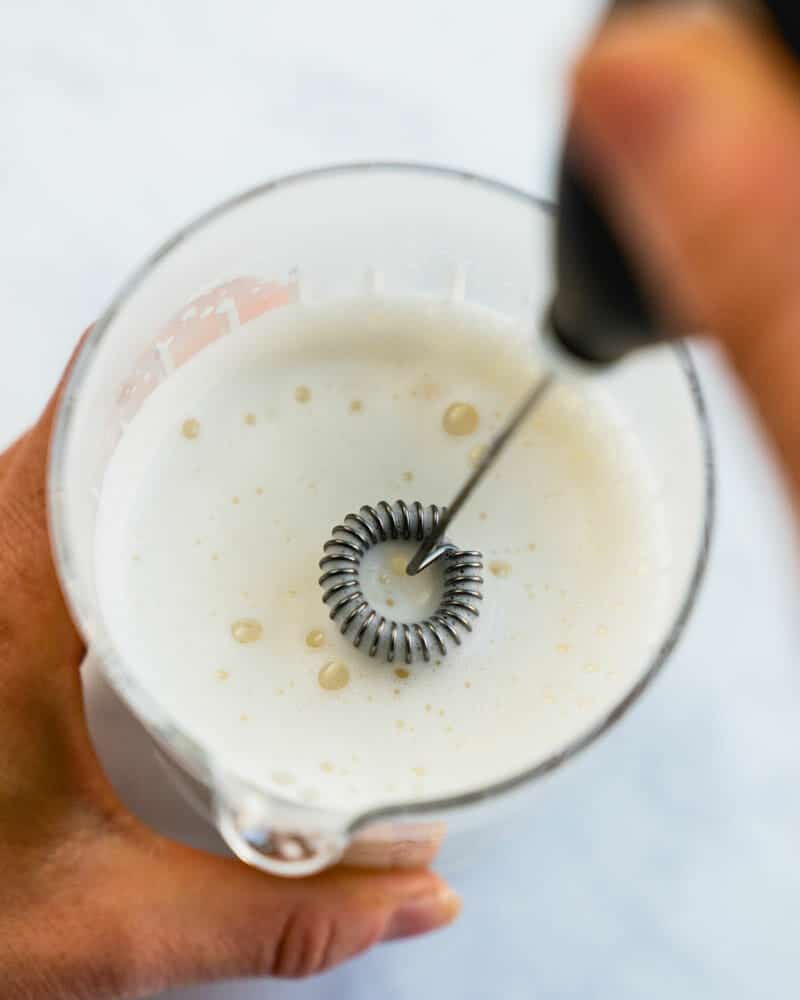Here’s how to make cappuccino at home! This popular espresso drink is creamy with just the right touch of foamed milk.

Do you love a great cappuccino? This small but mighty cup is one of the most famous espresso drinks of all! It stars that perfect combination of steamed milk, espresso and frothy foam. (For us, the macchiato tops our list of espresso drinks, but we’ll get to that later!) Guess what? You can make a barista-quality cappuccino in the comfort of your own home. In our Barista Series, we’re teaching you all the tricks you need to know to make your favorite coffee drinks…homemade! Here’s how to make a cappuccino that states like it’s straight out of an Italian café.
What is a cappuccino, exactly?
A cappuccino is an espresso drink with steamed milk, milk foam and espresso. It’s very similar to a latte (cafe latte), but the proportion of steamed milk is different. Here’s the breakdown of a latte vs cappuccino:
- A cappuccino has equal parts espresso, steamed milk and foam (⅓ each).
- A latte is ⅓ espresso and 2/3 steamed milk, with a thin layer of foam on top. Here’s a chart that breaks it down!
The differences between the two drinks are pretty subtle, and so is the flavor. But you’re in luck: the cappuccino is the easier of the two to perfect at home. With a latte you’re looking for microfoam, steamed milk with a wet-paint like texture that’s almost impossible to get without an espresso machine. A cappuccino can easily be made with frothed milk using various tools: even a whisk!

First, you’ll need espresso!
You’ll need to make espresso for a cappuccino: simply strong coffee will not do! This means you’ll need the following:
- Espresso roast coffee: The roast is important to get the right dark, bitter flavor. Also make sure to use a fine grind on the espresso when you make it.
- Espresso machine, manual espresso maker, or Aeropress: There are several ways to make espresso. We use an espresso machine, which sits on a countertop. Or you can use a small manual espresso maker: it’s cheaper and portable! The cheapest option is an Aeropress: it doesn’t make nearly as good of espresso, but it does the job. Go to Aeropress Espresso.

The best milk for a cappuccino
What’s the best milk to use for a cappuccino? Here’s what to know:
- Use milk that’s as fresh as possible! Milk that’s nearing its expiration date does not foam as well. Trust us: we learned that the hard way!
- The best milk for a cappuccino? Whole milk. Whole milk froths the best because it has the highest milk fat.
- You can also use 2% milk. It works fairly well, but you lose a bit of the richness.
- Use oat milk for a vegan cappuccino. The best non-dairy milk to use is oat milk: it froths up the best and has great flavor. Go to How to Froth Milk for more details.
How to steam milk with an espresso machine (perfect cappuccino)
The tool you need to steam milk? An espresso machine with a steamer! This makes the best foam for a cappuccino, and steaming milk also adds a sweet creaminess to the flavor. You don’t have to worry about the technique of microfoam like for the perfect latte, but it’s still nice to have an espresso machine for this coffee drink.
The downside? Espresso machines can be pricey. Here’s the espresso machine we use: it’s middle of the road price-wise and works great. But you can also make a cappuccino by simply frothing milk with a whisk: see below! Here’s how to steam milk for a cappuccino:
- Hold the steaming wand just below the surface of the milk until it doubles in size and is very foamy.
- Lower the steaming wand slightly until the milk reaches 150 degrees Fahrenheit: use a thermometer or judge by when your hand can’t hold the pitcher for more than a few seconds.
- Go to How to Steam Milk for more details!

How to froth milk: without an espresso machine (cheater method!)
Don’t have an espresso machine? No problem. For a great homemade cappuccino you can simply heat and froth the milk. There are a few different tools you can use to froth milk (see more at How to Froth Milk). Here are the best tools we’ve found for a home barista to froth milk:
- Handheld milk frother. A handheld milk frother is economical and works well. It gets the milk extremely frothy, which is great for a macchiato or cappuccino.
- French press. If you have a French press for making coffee, it’s great for making foam! It makes a nice frothy foam with bubbles a little larger than the frother.
- Whisk. A whisk works too! It whips up the milk pretty well: it also has a bit larger bubbles and generates a little less foam than the other methods.
How to make a cappuccino at home!
Got your tools, milk and espresso? Great. We can move on to the fun part: how to make a cappuccino! You’ll combine all the learnings you read about above to make this tasty espresso drink.
- Make the espresso using an espresso machine, espresso maker, or Aeropress (see above).
- Steam the milk (espresso machine method): Use the notes in the section above to steam the milk and get it nice and foamy.
- OR, heat the milk on the stovetop then froth it. A temperature of 150 degrees Fahrenheit is perfect: that’s where the milk is hot to the touch but not simmering. Then froth using your desired method to froth the milk until it’s very foamy. For a cappuccino you’ll want a good amount of froth: you’re going for ⅓ espresso, ⅓ steamed milk and ⅓ foam.
- Serve. Pour the frothed milk into the espresso and serve! It’s nice to use a latte cup, which holds the perfect amount.
And that’s it! How to make a cappuccino at home. Let us know if you give it a try, what tools you use, and how you like it!

Related drinks: the macchiato & iced cappuccino!
If you love making a cappuccino, you might also enjoy a macchiato (our personal favorite). A Macchiato is 2 shots espresso with a thick layer of foam on top. It has no steamed milk mixed into the drink! You make the steamed or frothed milk in the same way as a cappuccino. The difference is, you spoon all that “dry foam” off the top of the milk and dollop it into the espresso. It’s like a lighter cappuccino without the extra calories.
You can also try an Iced Cappuccino! Combine espresso and a splash of milk with ice, then top with a layer of fluffy cold foam. It’s a deliciously refreshing spin on the classic.
This cappuccino recipe is…
Vegetarian and gluten-free.
Print
How to Make Cappuccino
- Prep Time: 10 minutes
- Cook Time: 0 minutes
- Total Time: 10 minutes
- Yield: 1 drink 1x
Description
Here’s how to make cappuccino at home! This popular espresso drink is creamy with just the right touch of foamed milk.
Ingredients
- 2 espresso shots (2 ounces)
- 4 ounces (½ cup) fresh whole milk*
Instructions
- Make the espresso: Use an espresso machine or manual espresso maker to make two shots of espresso and pour it into a mug (or try our Aeropress Espresso).
- Steaming method (espresso machine): Place the milk in a pitcher. Hold the steaming wand just below the surface of the milk until it doubles in size and is very foamy. Lower the steaming wand slightly until the milk reaches 150 degrees Fahrenheit (use a thermometer or judge by when your hand can’t hold the pitcher for more than a few seconds).
- OR, heat the milk to scalding and foam it (without espresso machine): Heat the milk to 150 degrees Fahrenheit, which is hot to the touch but not simmering. Measure with a food thermometer, or you can approximate by testing with your finger. Use a milk frother, French press or whisk to froth the milk until it’s very foamy. For a cappuccino you’ll want a good amount of froth: you’re going for ⅓ espresso, ⅓ steamed milk and ⅓ foam. We highly recommend reading How to Froth Milk if this is your first time frothing. For the French press method, note that it’s useful to have at least 1 cup to have more milk to work with: this makes enough for 2 drinks.
- Serve: Swirl the milk container a few times. Pour milk and foam into center of the espresso.
Notes
*Whole milk works best; milk that is a few weeks old may not froth. You can also use oat milk for a vegan cappuccino. The milk frother works well; for the French press pump vigorously until frothy, about 25 times. Do not overwhip, as the foam will deflate!
- Category: Drink
- Method: Espresso
- Cuisine: Coffee
- Diet: Vegetarian
Keywords: How to make cappuccino
More coffee drinks & tea lattes
Love coffee and tea? Us too! Here are a few espresso drinks and tea lattes to master:
- Americano This popular coffee drink smooths the bitterness of espresso with hot water.
- Cafe au Lait or Cafe con Leche Enjoy these French and Spanish spins on coffee and milk.
- Mocha Rich and chocolaty, with just the right topping of fluffy milk foam.
- Flat White How to make this coffeehouse classic.
- Cold Brew Coffee Dark and chilled to perfection
- Cortado or Gibraltar Perfectly balanced with milk and espresso!
- Coffee Soda Grab a bubbly and bitter coffee soda!
- How to Make Pourover Coffee The best way we’ve found to make a stellar cup of pour over.
- Chai Latte, Vanilla Chai Latte, Iced Chai Latte, or Vegan Chai Latte The spiced chai latte is one of life’s greatest pleasures: try it four ways.
- Matcha Latte or Iced Matcha Latte Whip up these brilliant green drinks.
- London Fog A cozy tea latte made with Earl Gray tea and lavender.




I love a well made cappuccino, heavy on the nice, creamy froth! This recipe is perfect, too often they come out more like lattes.
★★★★★
Thank you for providing the detailed installation. I don’t have a espresso machine so I will rely on heating up the milk using oven or microwave. One thing I am not clear is that do you heat up the 1/3 part milk, and then make foam out of the other 1/3 milk, and then add them into the espresso? Or do you basically heat up the 2/3 part milk and make foam out it then add it into the expresso?
Thank you,
Joy
Hi! (2nd option) You heat up the 2/3 part milk to make foam, and pour that into the espresso.
Great information. I often have difficulty explaining to young people operating coffee machines, especially in fast food restaurants, that a cappuccino without chocolate sprinkles, (or in some cases a whole layer of chocolate!!), is NOT the same as a latte. I wish they would all read your great notes.
It’s an educative and informative write up. I have benefited so much and I’m interested in purchasing the espresso machine. How much and which is the best medicine. Please advise.
Regards
David
★★★★★
We use this one: https://rstyle.me/+74tJLkCiTxEZpFZ4yTFtCQ
This is a great recipe! I love cappuccinos and this recipe makes a great one.